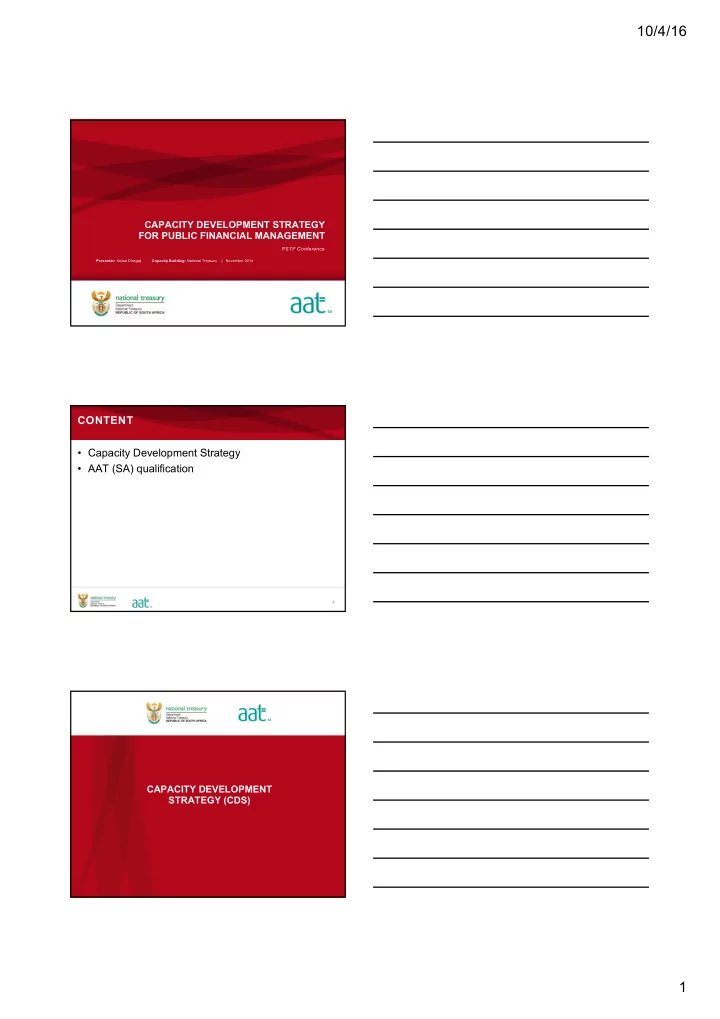

10/4/16 CAPACITY DEVELOPMENT STRATEGY FOR PUBLIC FINANCIAL MANAGEMENT PSTF Conference Presenter: Xolisa Dlanga | Capacity Building: National Treasury | November 2014 CONTENT • Capacity Development Strategy • AAT (SA) qualification 2 CAPACITY DEVELOPMENT STRATEGY (CDS) 1
10/4/16 Problem Statements & the CDS •South Africa’s shortage of skills is felt sharply in PFM. The public sector is falling behind in the competition for scarce skills. According to the South African Institute of Chartered Accountants (SAICA), there were 22 030 public and private sector auditing and accounting vacancies in 2008.” 4 Problem Statements & the CDS “An absence of effective partnerships leads to unsustainable efforts to meet capacity development requirements. Partnerships between government and education, training and development (ETD) stakeholders are inadequate” •Strategic Objective of the CDS 1: Support the development of an enabling environment •KA 1.10: Develop PFM – related occupational qualifications •KA 1.11: Support formal education and training programmes 5 INTEGRATED CAPACITY DEVELOPMENT FRAMEWORK 6 2
10/4/16 TRAINING PROGRAMME DEVELOPMENT & ROLL OUT • Capacity Development Strategy for Public Financial Management • Competency Frameworks for Financial Management (CFFM) • Integrated Learning Matrix (Map of learning offerings & gaps) • NT – AAT Financial Management Project Team – Development of qualification • Qualification Roll - Out – Eastern Cape, Limpopo, Northern Cape and Western Cape – Delivered in block learning format 7 Why AAT? • SO 1: support the development of an enabling environment • What is AAT? • Relationship between NT & AAT • Benefits of the qualification to PS! • Experience with AAT 8 PUBLIC SECTOR ACCOUNTING QUALIFICATIONS 3
10/4/16 BACKGROUND Pressure from Accountant-General and Auditor-General to assist in public sector • Gauteng DLG, together with DBSA, working on “Operation Clean Audit” • Collaboration between AAT and SAICA to develop and pilot the Local Government Accounting • Certificate (NQF3) in 2007/2008 Commitment of SAICA and AAT to continue development of Accounting Technicians NQF 3 to • NQF 5 - launch AAT (SA) – 21 October 2008 Delivery of local government Certificate and Advanced certificate to over 4 000 people nationally • National Treasury Approach in 2012 • SKILLS SHORTAGE Independent research survey into shortage of financial skills • • 739 organisations interviewed • 22 030 (approximately) accountants short across different levels • 16 642 vacancies at NQF levels 3 to 6 in both financial and non- financial services sectors WHAT IS AAT(SA)? The Association of Accounting Technicians South Africa - AAT(SA) - is a finance and accountancy professional body that offers practical, internationally recognised qualifications and support. It provides great benefit to financial staff at all levels, from people in clerical and administrative positions to professional accountants. AAT(SA) is dedicated to the education, development, regulation and support of finance and accounting staff to help them earn the professional respect, recognition and rewards they deserve. 4
10/4/16 QUALIFICATIONS Local Business Public Sector Government Stream Stream Stream LG Diploma in Diploma in Public Sector Accounting – Accounting Diploma - 2016 November 2012 Public Sector Advanced LG Advanced Advanced Certificate in Certificate Certificate – July Accounting 2012 Public Sector Certificate in LG Accounting Certificate - July Accounting Certificate 2012 Qualification Outcomes Public Sector Accounting Certificate: this certificate develops skills in double entry bookkeeping and gives an understanding of management and administrative process. Public Sector Accounting Advanced Certificate: introduces complex accounting tasks including preparation of final accounts, maintaining cost accounting records and preparing reports and returns. Public Sector Diploma: (Mandatory Units & two electives) Will focus on the areas of accounting most relevant to your needs including audit preparedness, financial statements and financial ratios. SELECTION CRITERIA PSAC • Open Access • Aimed at entry-level provincial/national department financial employees PSAAC • PSAC OR • Matric Mathematics (not maths literacy) • Experience in the recording departmental revenue and receipts • Experience in making and recording payments • At least supervisory level experience for a minimum of two years • A previous post-school qualification in accounting would be an advantage • Current role two levels above entry level within the department 5
10/4/16 BENEFITS OF QUALIFICATIONS Recognition - qualification • Will be registered with SAQA • Will be registered learnerships (tax and Seta benefits) • Internationally recognised Quality assurance • Accredited providers • Externally set examinations • Support of AAT and SAICA Staff benefits • Competent staff • Professional and proud staff HOW DOES IT WORK? • Classes of between 20 and 25 • Classes at departmental offices • PSAC – 18 days facilitation, plus revision and assessment over 12 months • PSAAC – 40 days plus revision and assessment over 24 months • Timetable agreed with department • Accredited training providers appointed by AAT(SA) OR Department • Timetable can be shortened at employer discretion PROJECT MANAGEMENT • Departmental Champion • Quarterly provincial project meetings (including champion, AAT(SA), provider, Provincial Treasury, PSeta and other stakeholders) • Proper advocacy • Training provider reports • Quarterly AAT(SA) reports 6
10/4/16 PROFESSIONAL MEMBERSHIP Membership = Academic knowledge + Practical competence 1. Qualification 2. Workplace experience AAT Qualifications Recognition of Prior Learning THANK YOU 7
Recommend
More recommend